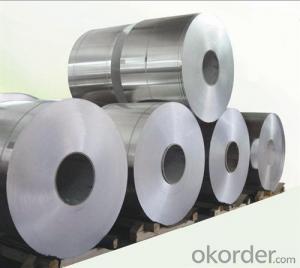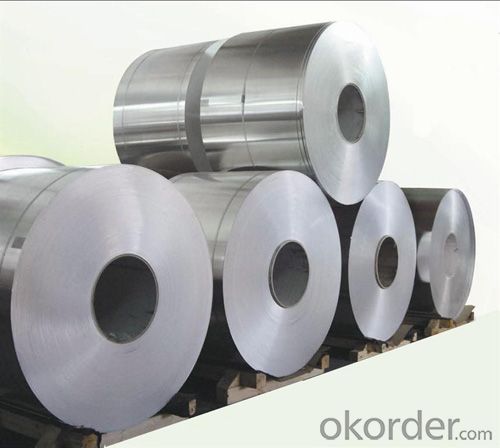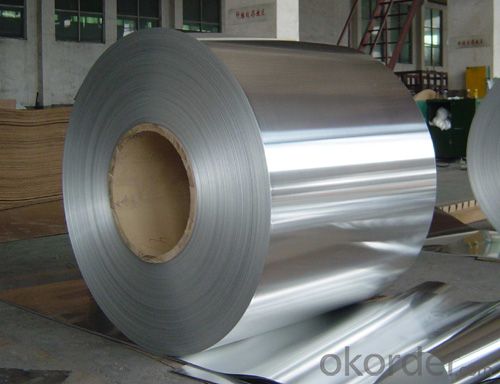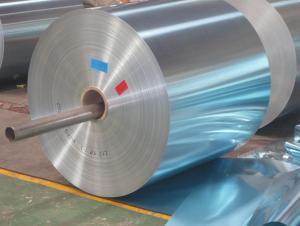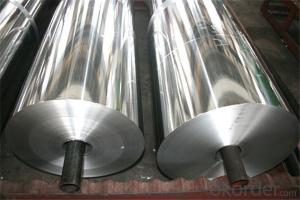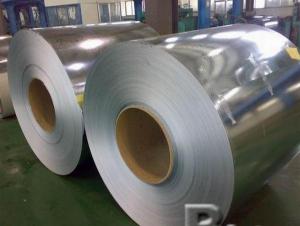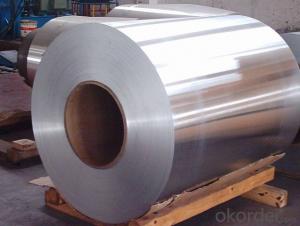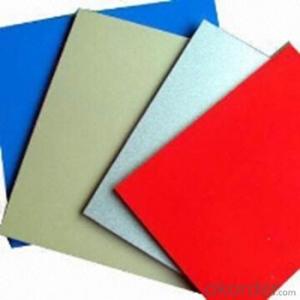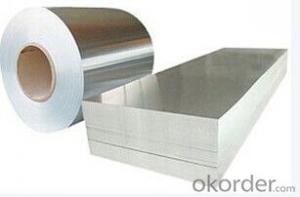1145 H19 Aluminum Coil Foil for Controlled Atmosphere Brazing
- Loading Port:
- China main port
- Payment Terms:
- TT OR LC
- Min Order Qty:
- 5 m.t.
- Supply Capability:
- 10000 m.t./month
OKorder Service Pledge
OKorder Financial Service
You Might Also Like
Specification
1.Specifications of Aluminum Coil For Controlled Atmosphere Brazing
Alloy and Temper: 4004-O
Thickness: 0.20-3.0mm
Width: 16-1600mm
Advantage: we could divide the coil into narrow size according to customer’s request.
Package: seaworthy package.
2.Feature of Aluminum Coil For Controlled Atmosphere Brazing
steady and consistent quality, good product durability, high performance and cost ratio, professional team.
3. Certificate:
SGS and ROHS(if client request, paid by client), MTC(plant provided), Certificate of Origin(FORM A, FORM E, CO), Bureau Veritas and SGS (if client request, paid by client), CIQS certificate
4. Image of Aluminum Coil For Controlled Atmosphere Brazing
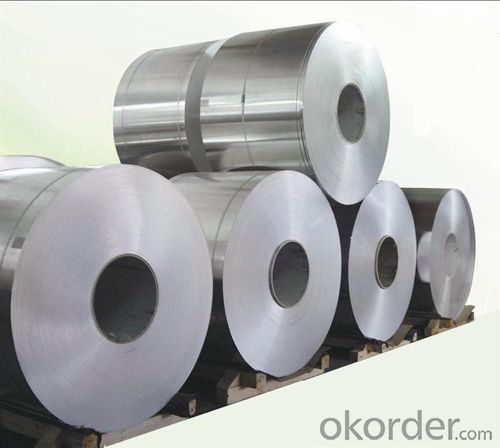
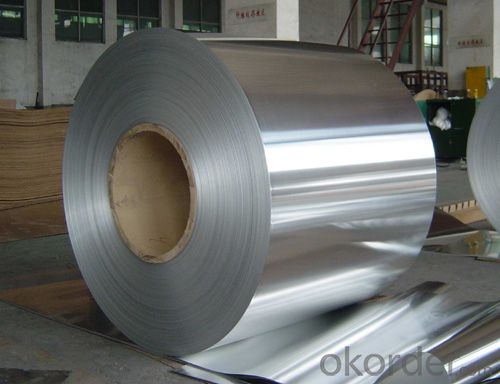
5.FAQ
1) What is the delivery time?
Dpends on actual order, around 20 to 35 days
2)What is the QC system:
We have QC staff of 20 persons and advanced equipment, each production is with MTC traced from Aluminum ingot lot.
3) What market do you mainly sell to?
- Q: Can aluminum coils be used in pharmaceutical manufacturing?
- Pharmaceutical manufacturing can indeed utilize aluminum coils. In the pharmaceutical industry, aluminum is commonly employed for diverse tasks like packaging and manufacturing equipment. Aluminum coils are capable of producing containers, caps, and closures for pharmaceutical products. Particularly, these coils find extensive use in the manufacturing of blister packs, which are widely employed for packaging tablets and capsules. The preference for aluminum in pharmaceutical manufacturing is due to its exceptional barrier properties, resistance to corrosion, and capacity to safeguard the integrity of pharmaceutical products. Furthermore, aluminum possesses the advantages of being lightweight, recyclable, and having a low melting point, rendering it a versatile and cost-efficient option for pharmaceutical manufacturing.
- Q: What are some normal everyday products made from aluminum that I can use to recycle?
- cool drink cans.
- Q: I would like to know why the ionic substance aluminium oxide doesn't dissolve in water.
- Aluminium gives away 3 electrons, and two aluminium atoms are combined with 3 oxygen atoms, the charge is just to great for it to gracefully dissolve.
- Q: How do aluminum coils contribute to fire safety?
- Fire safety is greatly enhanced by the presence of aluminum coils. Primarily, aluminum is a material that does not burn or support combustion, making it an ideal choice for industries where fire safety is of utmost importance, such as construction. In the manufacturing sector, aluminum coils are commonly utilized to create fire-resistant barriers and protective claddings. These barriers function as a shield, effectively halting the spread of flames and heat across different sections of a building. By containing the fire and preventing its spread, aluminum coils play a pivotal role in limiting the destruction caused by fires and ensuring the safety of individuals. Moreover, aluminum coils are frequently employed in the fabrication of fire-resistant doors, windows, and curtain walls. These components are specifically designed to endure high temperatures and serve as an effective barrier against the propagation of fire and smoke. By utilizing aluminum coils as the fundamental material for these products, they can offer superior fire protection and help prevent the rapid advancement of flames in the event of a fire. Additionally, aluminum possesses excellent thermal conductivity in addition to being non-combustible. This characteristic enables it to swiftly dissipate heat, reducing the risk of ignition and minimizing the potential for fire accidents. Aluminum coils are often incorporated into heat exchange systems, such as HVAC units and refrigeration systems, where their thermal conductivity aids in temperature regulation and prevents overheating, further reducing the risk of fire. In conclusion, aluminum coils make significant contributions to fire safety by virtue of their non-combustible nature, their ability to serve as fire-resistant barriers, and their use in the production of fire-resistant doors and windows. Their capacity to dissipate heat rapidly also plays a crucial role in minimizing the risk of fire accidents. By employing aluminum coils in various fire safety applications, we can enhance the protection of buildings and ensure the safety of individuals in the event of a fire.
- Q: Can aluminum coils be used in high-pressure or high-temperature environments?
- High-pressure or high-temperature environments typically do not recommend the use of aluminum coils. Although aluminum is known for its high thermal conductivity and resistance to corrosion, it has limitations when exposed to extreme conditions. When it comes to high-pressure environments, aluminum coils may lack the necessary strength and durability required to withstand the forces exerted by pressurized systems. Aluminum has a lower tensile strength compared to metals like steel or titanium, making it more vulnerable to deformation or failure under high pressure. Therefore, it is generally advisable to use materials with higher strength and pressure ratings in such situations. Likewise, aluminum coils have a relatively low melting point compared to metals such as steel or copper. Aluminum's melting point is approximately 660 degrees Celsius (1220 degrees Fahrenheit), which makes it susceptible to damage or failure in high-temperature environments. For applications where the temperature exceeds the melting point of aluminum, it is recommended to use materials with higher temperature resistance. However, it is important to note that there are specialized alloys and coatings available that can enhance the high-temperature and high-pressure capabilities of aluminum. These modifications can improve its strength, heat resistance, and corrosion resistance, making it suitable for certain applications in extreme conditions. Nevertheless, it is crucial to carefully consider the specific requirements and limitations of the intended environment before deciding to use aluminum coils. Seeking advice from experts and considering alternative materials may be necessary to ensure the safety and efficiency of the system.
- Q: Is it possible to customize the dimensions of aluminum coils?
- Yes, it is possible to customize the dimensions of aluminum coils. Aluminum coils can be cut and shaped according to specific requirements and dimensions based on the application they are intended for. Customization allows for flexibility in design and ensures the aluminum coils meet the specific needs of the project.
- Q: Who knows about how much money can be sold in a three metre high similar aluminum door?
- How wide is it, mainly to see the door you have multiple components, scrap is generally about 10 yuan a kilogram!
- Q: This question asks about the impact of aluminum coils on the quality of welding. It seeks to understand the relationship between the material properties of aluminum coils and the outcomes of the welding process.
- <p>Aluminum coils can significantly affect welding quality due to their unique properties. Aluminum has a high thermal conductivity, which requires more energy to weld, and can lead to rapid heat dissipation, affecting the weld's uniformity. Oxides on the aluminum surface can also interfere with the welding process, causing porosity and poor joint strength if not properly cleaned. Additionally, aluminum's low melting point can lead to distortion and warping if not managed correctly. The use of appropriate filler materials, proper cleaning, and precise control of welding parameters are crucial to achieve high-quality welds with aluminum coils.</p>
- Q: I have a mig welder, and I would like to learn to weld aluminum. I have been told that I must buy an aluminum wire spool gun, because the standard mig wire feeder gun will not work with aluminum wire. I don't understand why my standard wire feeder will not work. It feeds wire just like a spool gun. Why do I need to spend money on a spool gun just to weld aluminum? If a spool gun is truly necessary, where can i find one for a reasonable price? Thanks for your help!
- NO okorder /
- Q: How are aluminum coils used in the production of battery enclosures?
- Aluminum coils are widely used in the production of battery enclosures due to their excellent properties. Firstly, aluminum is a lightweight material, making it ideal for creating lightweight battery enclosures, which is crucial for portable devices and electric vehicles where weight reduction is important. Additionally, aluminum coils can be easily formed into different shapes and sizes, allowing manufacturers to customize the battery enclosures to fit specific battery designs. This flexibility in shaping also helps to optimize space utilization and improve the overall efficiency of the battery system. Moreover, aluminum is highly resistant to corrosion, which is essential for battery enclosures as they are often exposed to harsh environments and chemicals. This corrosion resistance ensures the longevity and reliability of the battery enclosure, protecting the battery cells from damage and ensuring safe operation. Furthermore, aluminum has excellent thermal conductivity, allowing it to efficiently dissipate heat generated during the battery charging and discharging process. This is vital for preventing overheating and maintaining the optimal temperature range for battery performance. In conclusion, aluminum coils play a crucial role in the production of battery enclosures by providing lightweight, customizable, corrosion-resistant, and thermally conductive properties. These properties contribute to the overall efficiency, safety, and longevity of battery systems used in various applications such as consumer electronics, electric vehicles, and renewable energy storage.
Send your message to us
1145 H19 Aluminum Coil Foil for Controlled Atmosphere Brazing
- Loading Port:
- China main port
- Payment Terms:
- TT OR LC
- Min Order Qty:
- 5 m.t.
- Supply Capability:
- 10000 m.t./month
OKorder Service Pledge
OKorder Financial Service
Similar products
Hot products
Hot Searches
Related keywords
